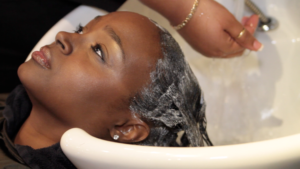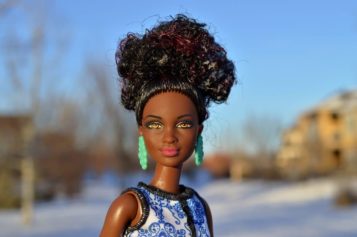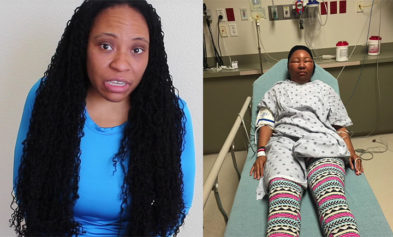
For most of recent history, “good hair” implied straight, silky hair that flowed like Beyonce’s mane in the wind (machine). Textured hair, on the other hand, earned the label “kinky,” which by definition means filled with kinks — flaws or imperfections — as in kinks in a plan.
That was then.
Sure, these notions may never completely die in a society that deifies European beauty ideals, but if Rock were to peddle textured hair in Crenshaw today, he might get a different response.
“Right now the coily textured, tightly coiled hair, which everybody would call 4a, b and c, is the most popular texture because the natural hair movement is in full swing,” says celebrity stylist and natural hair guru Diane Da Costa. Da Costa, who runs the SimpleeBeautiful salon in White Plains, New York, wrote the book on natural hair. Literally. She co-authored the Milady Standard Natural Hair Care and Braiding textbook, one of the preeminent references on natural hair for cosmetology schools, as well as Textured Tresses: The Ultimate Guide to Maintaining and Styling Natural Hair (Simon & Schuster).
“Highly textured hair is ‘it’ right now. It’s the hair to have,” she enthused.
Da Costa honed her skills in the leading natural salons in New York City during the ’80s, just as a newly minted Black professional class began to gravitate toward cultural styles.
“Blacks were coming into positions where they had already climbed the ladder and they could truly identify with themselves,” she reflects.
Back then, natural styles were conservative. “Nothing like we are now,” she reflects. “It was either a short, cropped cut or braids.”
The movement was local, largely confined to New York, D.C., and Atlanta — and Brooklyn was, without a doubt, the natural hair mecca.
Over the years, veteran stylists like Da Costa have watched the movement reach its zenith, a moment that coincided with the rise in social media and millennials coming of age.
Unlike the ’60s, this time around, freeing the hair to do as it pleases has less to do with political liberation, and more to do with health, autonomy and personal growth. For millennial women who share hair stories and advice on the Internet, going natural feels like joining a coveted sorority for which the only pledge process is a big chop.
“To see all of this happening, I’m like finally. It’s actually here,” says Da Costa. But oddly enough, the moment she helped create feels like the best of times, and the worst.
As more and more women cut out their perms, they are also cutting ties with their stylists, forgoing cultural legacy to play kitchen beautician. The Black hair salon, long revered as an institution, a safe space for women of color, and the last bastion of the Black beauty industry largely controlled by African-Americans, is rapidly losing its relevance.
“I opened my salon, Dyaspora, in 1996 and I was one of the top natural hair salons in the country. I made so much money because everybody was getting their hair done,” Da Costa recalls. But back in 1996, about a decade shy of the social media revolution that would turn the Black hair care industry on its head, no one in her position could have predicted the future.
“My sales are nowhere near what they should be based on who I am and the expertise I have,” she laments.
There are several cultural forces conspiring to dismantle traditional beauty salons. The greatest might be the Internet, where megasites like “CurlyNikki” and popular YouTube hair gurus help Black women unravel the mysteries of their own hair.
Cosmetic companies, eager to capitalize on the movement, are saturating the market with lotions and potions that promise to define curls and defy frizz. The inundation of products fuels a culture of experimentation and self-professed “product junkies.”
There’s the matter of convenience — daylong visits are anathema to women belonging to the so-called “ADD generation”.
And then, there is a more covert force at play. “The bottom line is they want to save money,” says Da Costa.
The women at the forefront of the movement, millennials, graduated into a recession. Those low starting wages and unemployment spells are likely to compromise their earnings for a lifetime. For this reason, a new crop of salons, operating on a low-price, high-volume business model, present the greatest threat to Black salons.
These are the Dominican salons found throughout African-American neighborhoods that offer wash, set and blow-out services for as little as $25, and the weave bars that install hair extensions at bargain prices.
But Da Costa worries that these attempts to save money in the short term, will cost clients far more in the long term.
“When you do low-price point, the products are inferior. You’re going to get what you pay for and over time, your hair is going to get damaged.”
Da Costa has seen clients forced to transition into natural after years of damage from low-price salons. “Their hair is damaged or their scalp is burnt or their hair is falling out.”
Like all industries in flux, Black hair salons are ripe for disruption.
Entrepreneur Folake Oguntabi recently made headlines for establishing a blow-out bar for natural hair in Manhattan. SimpleeBeautiful, Da Costa’s salon in White Plains, New York, has a curly texture bar where she also offers blow out services from $45.
Standing appointments and expensive chemical services are becoming increasingly obsolete, but savvy stylists are still finding ways to entice a new generation of clients, often with services that aren’t so easy to D-I-Y, like precision cuts, hair color, weaves and treatments that make at-home care easier.
The future remains dark for stylists with an eye toward the past, those who refuse to acquire the skills required for textured hair. But those willing to embrace the movement are finding tremendous opportunity, whether it’s establishing natural hair care salon in underserved markets, or developing their own product lines.
“When I first started in the business, there were two natural hair companies not African-American owned,” says Da Costa. “Now we have hundreds of companies making natural hair products, doing well.”
The big winners, of course, are Black women. For the first time, cosmetic companies and even cosmetology schools are investing extensively in multicultural hair training and research. In some states, like New York, natural hair stylists require a special license, and 70 percent of all salons have some person specializing in curly textured hair, even if it’s not Black hair, per se.
The Black beauty tradition is changing, but with that change comes the power and wherewithal for women of color to do with their hair as they please.

